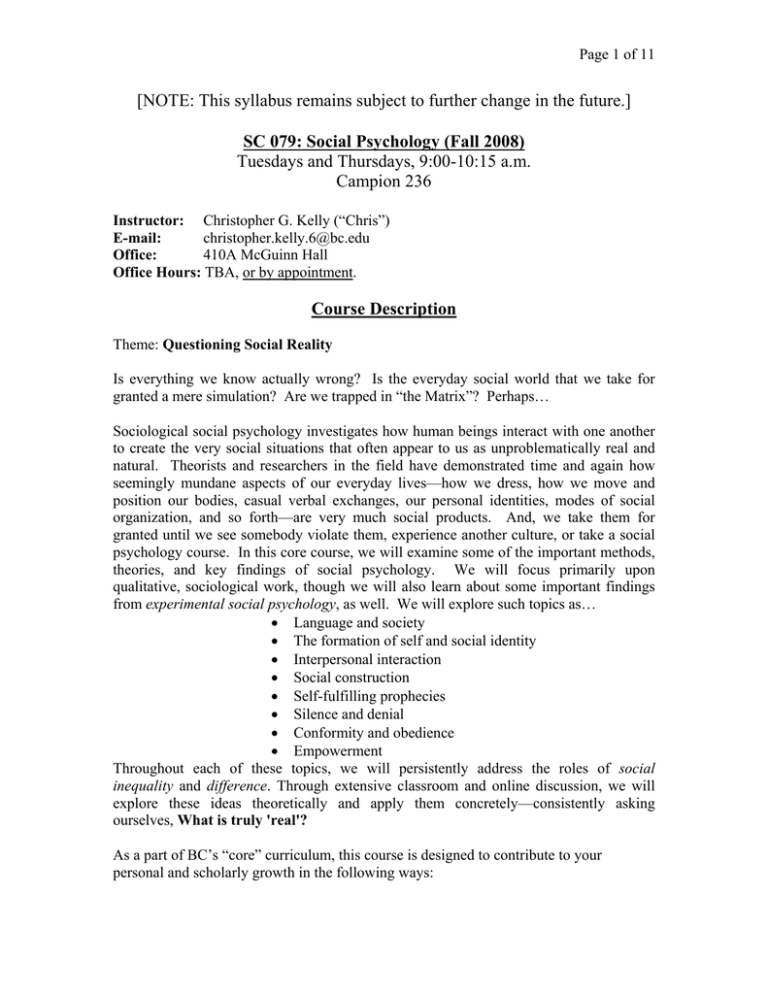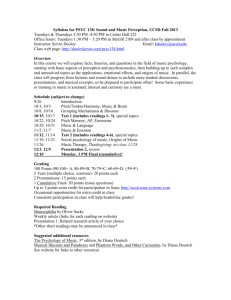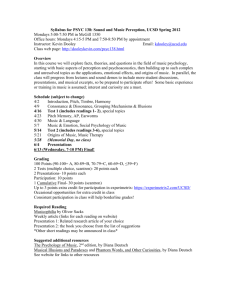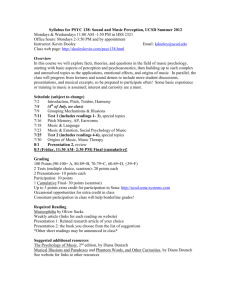[NOTE: This syllabus remains subject to further change in the... Tuesdays and Thursdays, 9:00-10:15 a.m. SC 079: Social Psychology (Fall 2008)
advertisement

Page 1 of 11 [NOTE: This syllabus remains subject to further change in the future.] SC 079: Social Psychology (Fall 2008) Tuesdays and Thursdays, 9:00-10:15 a.m. Campion 236 Instructor: Christopher G. Kelly (“Chris”) E-mail: christopher.kelly.6@bc.edu Office: 410A McGuinn Hall Office Hours: TBA, or by appointment. Course Description Theme: Questioning Social Reality Is everything we know actually wrong? Is the everyday social world that we take for granted a mere simulation? Are we trapped in “the Matrix”? Perhaps… Sociological social psychology investigates how human beings interact with one another to create the very social situations that often appear to us as unproblematically real and natural. Theorists and researchers in the field have demonstrated time and again how seemingly mundane aspects of our everyday lives—how we dress, how we move and position our bodies, casual verbal exchanges, our personal identities, modes of social organization, and so forth—are very much social products. And, we take them for granted until we see somebody violate them, experience another culture, or take a social psychology course. In this core course, we will examine some of the important methods, theories, and key findings of social psychology. We will focus primarily upon qualitative, sociological work, though we will also learn about some important findings from experimental social psychology, as well. We will explore such topics as… • Language and society • The formation of self and social identity • Interpersonal interaction • Social construction • Self-fulfilling prophecies • Silence and denial • Conformity and obedience • Empowerment Throughout each of these topics, we will persistently address the roles of social inequality and difference. Through extensive classroom and online discussion, we will explore these ideas theoretically and apply them concretely—consistently asking ourselves, What is truly 'real'? As a part of BC’s “core” curriculum, this course is designed to contribute to your personal and scholarly growth in the following ways: Page 2 of 11 Perennial Questions. We will interrogate several fundamental questions in the study of human social interaction, such as: • What aspects of everyday life do we take for granted? • How do these come to take on the appearance of being “natural” or “given”? • How do we decide/know what is “true” and “real”? Or what is the “right” or “wrong” way to act in a given situation? • What does it take to unsettle our tendency to take social reality for granted? How do we come to question things? • Can these social realities be challenged? Should they be? Historical Perspective. We will look at a combination of both contemporary and classic work in this class. In addition, we will learn how to look at the work of the past with an eye to its socio-historical context and critique that work for the potential biases of its authors. Finally, we will see how the social processes examined in the class have affected both the past and the present—and how they could affect the future. Methodology. You will be introduced to both interpretive and positivist approaches to social psychology. Because this is a sociological version of the course, focusing primarily on interaction, we will look primarily at qualitative studies, but we will also examine important experiments, as well. We will also work on developing your ability to critically evaluate research findings on the basis of their methods, arguments, and use of evidence. Writing. This will be an essential component of this course, and you will be expected to engage in a number of different styles analysis, criticism, and debate, through classroom and online discussions of class reading. Students are expected to build upon whatever writing skills they have and improve them throughout the course. Cultural Diversity. Readings are designed in order to provide you with an eye to both more general social psychological processes and to the myriad ways in which these processes are inflected by differences in race, class, gender, religion, sexual orientation, social status, and other social identities. We will also come to understand the ways in which these processes may differ from one culture to another—decentering our own respective cultures in the process and entertaining alternative perspectives. (NOTE: This class does NOT meet the Cultural Diversity requirement.) Creating a Personal Philosophy. This course is designed to challenge you to think about your everyday social interactions and realities from a different, more theoretical and sociological standpoint. In so doing, you may develop more complex or better articulated personal beliefs about how humans should interact with one another and navigate their social worlds. You are encouraged to use the classroom environment as a space to explore these ideas more fully. Texts (Available at BC Bookstore) iClicker Page 3 of 11 O’Brien, Jodi A. 2006. The Production of Reality: Essays and Readings on Social Interaction. Pine Forge Press. Zerubavel, Eviatar. 2006. The Elephant in the Room: Silence and Denial in Everyday Life. Oxford: Oxford UP. Assignments and Requirements 1. Blogging (10 points): Ten times throughout the semester, you will be expected to create a blog post about your experiences with the class, the instructor, the students, the reading material, the subject matter, the assignments, or anything else that is significant to you. You may write whatever you like, provided that it is not denigrating or disrespectful towards another person or group of people (which, in fact, is applicable to anything you say or write in this course). Blog posts will be “staggered” across the semester. 2. Online Discussion (15 points): Ten times throughout the semester, you will be expected to contribute to online discussion about the issues raised in that week. Your response must indicate not only that you have read the reading but also that you are thinking about it deeply and critically. You may contribute either by responding to a pre-existing question or by asking one of your own; if you ask your own question, it must be one that is constructed to invite deep and thoughtful dialogue and debate about the concepts and arguments raised in the readings. Unacceptable questions (e.g., those that call only for a definition, a short answer, an opinion, etc.) will be deleted. Contributions will be staggered. 3. Student Webpage (5 points): This is just a brief exercise in order to (a) help us all get to know one another and (b) get you comfortable using the Google site, as well as achieving other classroom goals. You will be asked to provide some basic personal information, tell us “who you are” in a creative manner, and write a funny story. 4. Participation: Participation will entail a number of elements—including, but not limited to, the following: homework, classroom discussion, online discussion beyond what is required, responding to one another’s blog posts, assisting your fellow students, and seeking assistance from me, when needed. I will seek your input in designing a fair and reasonable set of guidelines for participation. 5. Midterm and Final Exam or Project: There will be a midterm exam/project and a final exam/project that will cover important concepts from the readings and also test your ability to formulate, compose, and defend an intellectual argument. You will have an opportunity help determine the content and structure of these exams/projects. You may wish to combine these into a single project. Points: The class will have 100 points total. As you can see above, the points allocated to blogging, online discussion, and student webpage are already “set in stone”; this is necessary due to the nature of these components. However, you will be asked to help me Page 4 of 11 decide how the remaining 70 points should be distributed among the midterm, the final, and classroom participation. Topic and Reading Schedule Please have readings completed by the dates indicated in class and/or through announcements. Dates of actual material coverage will be flexible. In addition, please keep in mind that any reading may be revisited, possibly multiple times, during the semester. Finally, any reading marked with a “*” is found through online reserves. All others are in either the O’Brien volume or the Zerubavel text. Important Dates: October 7, 2008: Midterm Discussion Day (Can be moved around) November 27, 2008: NO CLASS: Have an excellent break! ☺ **MODULE 1: INTRODUCING SOCIAL PSYCHOLOGY** Thinking Social-Psychologically: The Case of Silence Zerubavel, Eviatar. The Elephant in the Room: Silence and Denial in Everyday Life. Learning to Question O’Brien, Jodi. “What is Real?” *Miner, Horace. 1956. “Body Ritual among the Nacirema.” American Anthropologist 58: 503-507. *Epstein, Robert. 1997. “Folk Wisdom: Was Your Grandmother Right?” Psychology Today (Nov/Dec). NACIREMA HOMEWORK: In your notes, jot down a few aspects of the Nacirema culture that stood out to you, intrigued you, delighted you, scared you, shocked you, offended you, etc. Be prepared to discuss your reactions in the classroom. Interactionism and Interpretivism O’Brien, Jodi. “Symbolic interactionism: a perspective for understanding self and social interaction.” Babbie, Earl. “Truth, Objectivity, and Agreement” Schwandt, Thomas A. “Constructivist, Interpretivist Approaches to Human Inquiry” *Mills, C. Wright. 2005. “The Sociological Imagination.” Pp. 11-20 in The Spirit of Sociology: A Reader, edited by Ron Matson. Boston: Pearson. MILLS HOMEWORK: Jot down, in your notes, an answer to the following question: Why did I ask you to read Mills on the same day that we discuss these other readings? What is the connection? Experimental Social Psychology Page 5 of 11 * Gray, Paul S., Williamson, John B., Karp, David A., and Dalphin, John. 2007. The Research Imagination: An Introduction to Qualitative and Quantitative Methods. Cambridge UP. Chapter 12: “Experimentation” *Jost, John T. and Kruglanski, Arie W. 2002. “The Estrangement of Social Constructionism and Experimental Social Psychology: History of the Rift and Prospects for Reconciliation” Personality and Social Psychology Review 6(3), 2002, pp. 168-187 *Festinger, Leon, and Carlsmith, James M. 2000. “Cognitive Consequences of Forced Compliance.” Pp. 104-112 in Readings in Social Psychology, edited by Wayne A. Lesko. Boston: Allyn and Bacon. (OPTIONAL, but recommended, as it will be discussed in class) **MODULE 2: MEANING, SELF, AND SOCIETY** Creating Meaning O’Brien, Jodi. “Shared Meaning is the Foundation of Humanness” Lakoff, George, and Johnson, Mark. “Metaphors We Live By” Zerubavel, Eviatar. “Islands of Meaning” Symbols, Meaning, and Humanity Hughes, Langston. “That Powerful Drop” Cassirer, Ernst. “A Clue to the Nature of Man: The Symbol” Sacks, Oliver. “Yes, Father-Sister” Davis, Kingsley. “Final Note on a Case of Extreme Isolation” Moore, Robert. “Racism in the English Language” “MEANING” HOMEWORK: How have symbols and meaning affected your life? Self and Society The Self as a Social Product O’Brien, Jodi. “From Masks to Selves” Mead, George Herbert. “The Self, The I, and the Me” Cooley, Charles Horton. “The Looking Glass Self” Self-Presentation *Goffman, Erving. 1959. The Presentation of Self in Everyday Life. New York: Anchor Books. Introduction, pp. 1-16. Cheung, Charles. “Identity Construction and Self-Presentation on Personal Homepages” CHEUNG HOMEWORK: Consider showing your own homepage, MySpace page, or Facebook profile to the class. The Self and Social Inequality Race, Gender, and the Self Du Bois, W. E. B. “Double Consciousness and the Veil.” Page 6 of 11 *Hill Collins, Patricia. 2000. Black Feminist Thought: Knowledge, Consciousness, and the Politics of Empowerment. New York: Routledge. Chapters 4 (“Mammies, Matriarchs, and Other Controlling Images”) and 5 (“The Power of SelfDefinition”) HILL COLLINS HOMEWORK: Why did Collins choose the phrase “controlling images”? Why the word “controlling”? Why not just “negative images” or “stereotypical images”? Religion and the Self O’Brien, Jodi. “Wrestling the Angel of Contradiction: Queer Christian Identities” Chaudhry, Lubna. “‘We Are Graceful Swans Who Can Also Be Crows’: Hybrid Identities of Pakistani Muslim Women.” **MODULE 3: SOCIAL INTERACTION** Social Interaction O’Brien, Jodi. “Meaning Is Negotiated Through Interaction” Becker, Howard. “Becoming a Marihuana User.” Interaction and Defining the Situation *Goffman, Erving. “On Face Work” Lerum, Kari. “‘Precarious Situations’ in a Strip Club.” Interaction and Social Difference Higgins, Paul. “Encounters With the Hearing” Harris, Scott R. “Status Inequality and Close Relationships: An Integrative Typology of Bond-Saving Strategies” *Sherif, M., et al. 2001 “The Robber's Cave Experiment: Intergroup Conflict and Cooperation” in Classic and Contemporary Readings in Social Psychology, Third Edition, edited by Erik J. Coats and Robert S. Feldman. Prentice Hall. **MODULE 4: CREATING REALITY AND UNREALITY** What is the Matrix? The Social Construction of Reality O’Brien, Jodi. “Building and Breaching Reality.” *Allan, Kenneth D. 2006. Contemporary Social and Sociological Theory: Visualizing Social Worlds. Pine Forge Press. Chapter 2: “Constructing Social Reality,” pp. 27-47. *Lorber, Judith. 2005. “Night to His Day: The Social Construction of Gender.” Pp. 292-305 in The Spirit of Sociology: A Reader, edited by Ron Matson. Boston: Pearson. *Berger, Peter L. 1990. The Sacred Canopy: Elements of a Sociological Theory of Religion. Anchor. Chapters 1 and 2 (optional, but recommended) Page 7 of 11 Ethnomethodology Mehan, Hugh, and Wood, Houston. “Five Features of Reality.” Garfinkel, Harold. “A Conception of and Experiments with ‘Trust’ as a Condition of Concerted Stable Actions” *Allan, Kenneth D. 2006. Contemporary Social and Sociological Theory: Visualizing Social Worlds. Pine Forge Press. Chapter 3: “Organizing Ordinary Life,” pp. 49-71. (optional but recommended) Is Perception Reality? Self-Fulfilling Prophecies Watzlawick, Paul. “Self-Fulfilling Prophecies” Snyder, Mark. “When Belief Creates Reality: The Self-Fulfilling Impact of First Impressions on Social Interaction.” Seeing What We Want to See *Butler, Judith. 1993. “Endangered/Endangering: Schematic Racism and White Paranoia” in Robert Gooding-Williams, (ed.) Reading Rodney King, Reading Urban Uprising. London: Routledge. Pp. 15-22. *Lord, C. G., Lepper, M. R., & Preston, E. (1979). Biased assimilation and attitude polarization: The effects of prior theories on subsequently considered evidence. Journal of Personality and Social Psychology, 37, 2098-2109. OPTIONAL: OPTIONAL: **MODULE 5: SOCIAL INFLUENCE** Conformity *Cialdini, Robert B. 2001. Influence: Science and Practice. Boston: Allyn & Bacon. Chapter 4: “Social Proof” pp. 98-142. *Sherif, M. 1947. “Group influences upon the formation of norms and attitudes” In T. M. Newcomb & E. L. Hartley (Eds.), Readings in Social Psychology. New York: Holt. pp. 219-232. Obedience *Cialdini, Robert B. 2001. Influence: Science and Practice. Boston: Allyn & Bacon. Chapter 6: “Authority” pp. 178-202. Slide show about Stanford Prison Experiment: http://www.prisonexp.org/slide-1.htm (The final slide, #42, contains links to further reading, if you are interested.) Milgram Video and Discussion **MODULE 6: PROBLEMS AND SOLUTIONS** Boundaries and Contradictions Page 8 of 11 O’Brien, Jodi. “Boundaries and Contradictions” *Boellstorff, Tom. 2005. “Between Religion and Desire: Being Muslim and Gay in Indonesia” American Anthropologist 107(4): 575-585. *Khan, Mahruq. 2008. “‘I’m Muslim by God’s Grace; I’m Gay by God’s Grace’: Reconciling a Queer Muslim Identity in America” Where does all this lead? Bell, Inge, and McGrane, Bernard. “Adventures in Desocialization” hooks, bell. “Talking Back” O’Brien, Jodi. “Epilogue” Page 9 of 11 APPENDIX A Word to the Wise: Many students sign up for so-called “core classes” based on the assumption that “core” means “easy” (e.g., minimal reading, simple assignments, little engagement and interaction). However, as you can see from above, it means no such thing! On the contrary, “core” entails that the course will raise various issues, introduce you to a variety of perspectives on the subject matter, challenge you to develop your own ideas, seek to improve your writing and critical-thinking skills, and even take part in defining the shape of the class itself! For those reasons, this class is not designed to be easy at all; you will be expected to read and engage with many complicated and often dense texts, discuss and debate those texts with your instructor and fellow students, and write about those texts in papers and on tests. This especially applies to participation, both in class and online. This is not a class in which you can be minimally involved in class or on the website and expect to succeed; you must be intimately engaged at every step! If you do not feel motivated to be this engaged and would prefer more of a “backseat” role, then I highly recommend that you choose another class. I would prefer that you remain, and take up the challenge, but you must decide what is best for you. In short, you should take this class only if you accept the above things and are willing to commit to them! Class Policies: 1. Protest Rights: At any time, if you do not like the way things are progressing in the class, you may raise an objection or grievance to be heard by the rest of us (i.e., the instructor in the class). We will listen and discuss in order to come up with some kind of resolution satisfactory to all. This aspect of the class will require, of course, a heightened level of consideration for the needs and concerns of your fellow students—on the parts of both the objector and those listening to him/her. 2. Attendance: Frequent and responsible attendance to this class is important for two reasons. First, social psychology, as conceptualized by this instructor, is a complex topic; while you will no doubt learn a lot from the class readings, a lot of information—including “insider information”—will come from the instructor himself and from classroom discussions. To that end, it is important that you are in class to receive additional information not in the readings, and clarification of the readings. Second, because social scientists constitute a community (though broad and sometimes very divided), interaction among community members is very important. Thus, your own interaction with one another, and with the instructor, is no exception. At the same time, however, I understand that this is an early class and that you may have priorities that supercede this particular class. Therefore, a very strict attendance policy may not be what you need. What an attendance policy should do is (1) encourage regular attendance and (2) be fair to all of the students. For this reason, I will seek your input in designing a fair and reasonable attendance policy. Page 10 of 11 2. Writing: Social science writing is written up not just for oneself but for an entire community of social scientists and students—along with anyone else who takes an interest in your respective topics. Therefore, your writing needs to be clear, easy to understand (relative, of course, to the complexity of your ideas), grammatical, and visually neat. These features are necessary, though not sufficient, in order to get the highest grade possible on your assignments; in other words, points may be deducted for poor writing, depending on what we, as a class, decide about this issue. If you already know that you have difficulty with writing for any reason— unfamiliarity with the rules of English grammar, limited college prep, a learning disability, or anything else—please let me know, ASAP, so that I can communicate with you and help you decide upon an appropriate solution. Finally, Wikipedia is not a source! (This also goes for other encyclopedia-type articles.) You may use a Wikipedia or encyclopedia article to point you towards resources about a topic, but do not cite the article itself in any assignment. 3. Late Work: Work is due at the exact date and time specified. For every day that work is late (excluding Saturdays, Sundays, and school holidays) there will be a deduction from your score, unless you have been granted an extension. Extensions must be requested at least 24 hours before the assignment is due, will only be granted in extenuating circumstances (e.g., student illness, death or serious illness in the family, extensive work due in other classes at the same time), and only with appropriate documentation. 4. Internet: This class will make fairly extensive use of the Internet for downloading some course readings, class discussion, communication, and submitting assignments. Thus, it is imperative that you know how to use Blackboard proficiently and how to construct web documents, the latter depending on the type of system available to us. If you have any problem with any aspect of using the Internet in this course, it is your responsibility to bring this problem to my attention immediately. Unfamiliarity with the Internet, Blackboard, or any other online aspect of the course will not be accepted as an excuse for failing to complete requirements. • The Google Group is for discussion of actual subject matter, including the discussion requirement of your grade. • The blog is for the blogging requirement of your grade. • The Google site is for class announcements, your personal webpage, and classroom collaborations. You should check announcements at the site once per day. Announcements relevant to a particular class meeting will be sent no later than the midnight before that meeting. If, for some unforeseen reason, an e-mail is sent out after midnight before a class meeting, then you will not be responsible for it for that meeting. • Blackboard is for checking grades, downloading reserve readings, e-mail, and procedural discussions (not personal matters, not subject matter). • E-mail is for personal matters, such as informing the instructor of one’s absence on a particular day or seeking a meeting outside of regular office hours. Page 11 of 11 5. Disability: If you have a disability that could affect your class performance or that requires special accommodations, then you must let me know at the beginning of the semester. It is your responsibility to bring this up at the earliest possible moment. 6. Athletics: Student athletes must provide me with all proper documentation and semester game schedules ASAP. 7. Personal Problems: If you have any personal problems or difficulties that might affect your class performance, then you must let me know about this as early as possible. Such problems include, but are not limited to, the following: economic hardship, limited English proficiency, psychological/mental issues, and personal difficulties. 8. Academic Integrity: You are expected to adhere to Boston College’s standards of academic integrity (http://www.bc.edu/integrity) with respect to every aspect of this class. Any cheating, plagiarism, or other kind of academic dishonesty will result in a grade of zero and will be reported to the academic dean. This is non-negotiable. I reserve the option to change aspects of this syllabus and class, at any time, should circumstances appear to require such. In addition, I reserve the option to override collectively-made decisions by the class, should the need arise.






